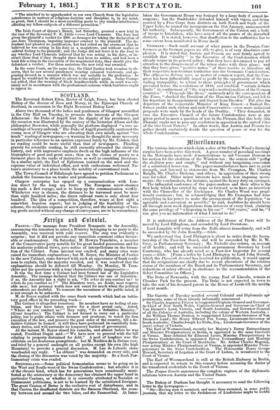SCOTLAND.
The Reverend Robert Eden, Rector of Leigh, Ease; has been elected Bishop of the diocese of Ross and Moray, in the Episcopal Church of Scotland, in succession to the Right Reverend Bishop Low.
Above two thousand of the ladies and gentlemen of Glasgow assembled in the City Hall on Tuesday, to promote the interests of the Glasgow Athenmum : the Duke of Argyll lent the dignity of his presidency, and the occasion was illustrated by the oratory of the historian Alison and the philosopher Brewster, while generally the platform displayed "a rare as- semblage of beauty andrank." The Duke of Argyll practically cautioned the young men of Glasgow who are educating their own minds, against "too much" reading of newspapers,—a warning he thought the more necessary in particular reference to an opinion expressed lately by Mr. Cobden, that no reading could be more useful than that of newspapers. Pleading gravely for scientific reading, he still earnestly advocated the claims of history, and with impressive emphasis dwelt on the high influence of the biographies of good and great men - then on the claims of poetry to a foremost place in the ranks of instructive as well as ennobling literature. In a similar spirit, the Earl of Eglintoun insisted on the need and the supreme value of individual effint, and with enthusiasm welcomed Na- ture's aristocracy to a place beside the nobility of conventional rank.
The Town-Council of Edinburgh have agreed to petition Parliament to abolish the Income-tax on trades and professions.
Glasgow enterprise has opeped up a communication with Lon- don direct by the long sea 1: onto. The European screw-steamer has made a first voyage, and is to keep up the communication we6kly. Whichever way is chosen, the distance'to be traversed must be more than eight hundred miles ; the direct railroad route is only about four hundred. The idea of a competition, therefore, wears at first sight a somewhat hopeless aspect ; but in judging of the feasibility of the scheme, the moderate expense of screw-power, and the advantage of hav- ing goods carried without any change of conveyance, are to be remembered.


























 Previous page
Previous page